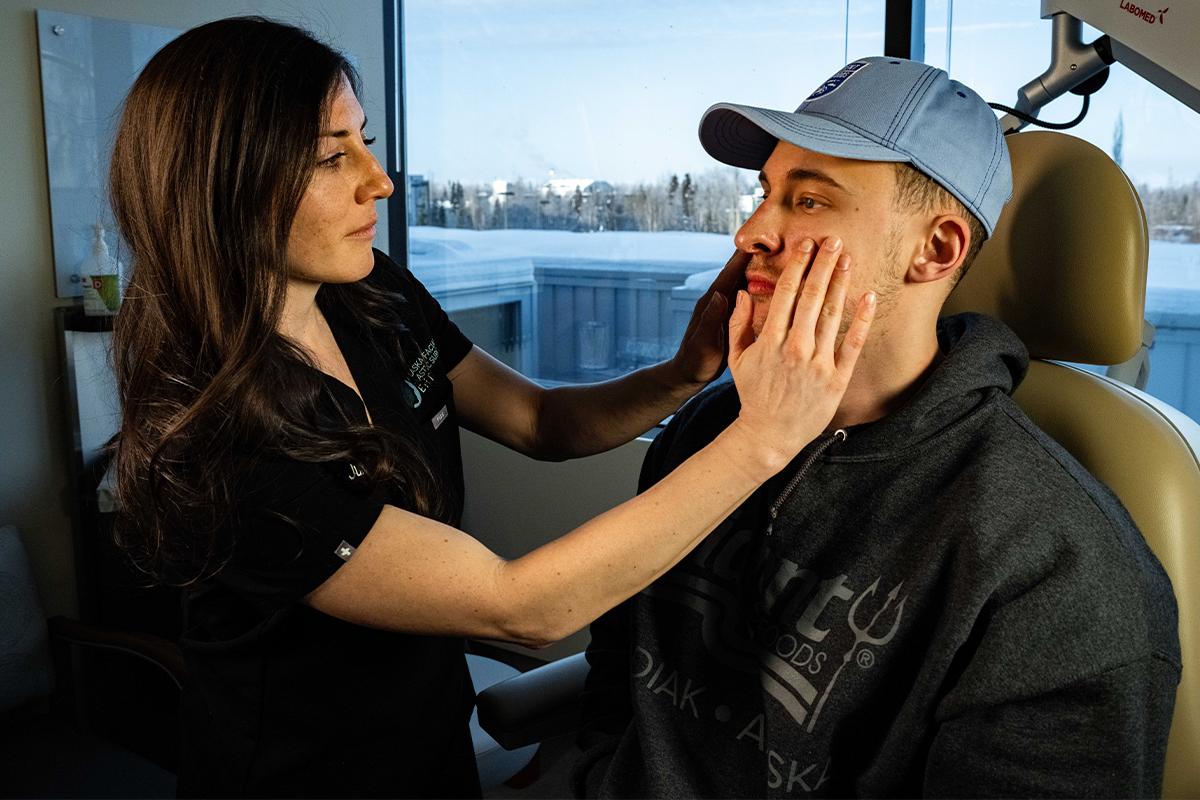Eliminate pituitary tumors effectively with transsphenoidal surgery, a minimally invasive procedure that targets and removes the tumors located near the base of the brain, ensuring quicker recovery and minimal side effects. Schedule your consultation with Dr. Sansoni, the only fellowship-trained advanced rhinology and skull base surgeon in Alaska, to treat pituitary disease.
Treat Pituitary Disease &
Restore Hormonal Balance
Transsphenoidal surgery is a medical procedure used to address pituitary gland disorders, such as tumors, cysts, or hormone imbalances. It involves creating a small incision at the back of your nasal cavity or upper lip, providing access to the pituitary gland situated at the base of your brain, behind the sphenoid bone. Through this minimally invasive approach, surgeons utilize specialized instruments and advanced imaging techniques to remove abnormal growths or alleviate pressure on surrounding tissues.
By accessing the pituitary gland through this route, transsphenoidal surgery minimizes trauma to the brain and surrounding structures, leading to quicker recovery times and reduced risk of complications compared to traditional open surgeries. Moreover, transsphenoidal surgery offers precise and targeted treatment for various pituitary disorders, including acromegaly, Cushing’s disease, prolactinomas, and non-secreting adenomas. This procedure can restore hormonal balance, alleviate symptoms, and improve your overall quality of life.

Advantages of Transsphenoidal Surgery:
- Minimally invasive approach compared to traditional open surgeries
- Reduced risk of complications such as infection and cerebrospinal fluid leaks
- Quicker recovery times
- Preservation of neurological function
- Direct access to the pituitary gland with minimal disturbance to surrounding structures
- Lower risk of damage to the optic nerves and other critical brain structures
- Potential for outpatient or shorter hospital stays
- Precision in tumor removal or treatment of pituitary disorders
- Improved hormonal balance and symptom relief
- Enhanced visualization and control through advanced surgical techniques and instruments
Transsphenoidal Surgery Treats:
- Pituitary tumors, including adenomas, craniopharyngiomas, and Rathke’s cleft cysts
- Hormonal imbalances, such as acromegaly, Cushing’s disease, and prolactinomas
- Growth abnormalities, such as acromegaly (enlarged hands, feet, and facial features)
- Other hormonal imbalances caused by pituitary dysfunction
- Growth hormone deficiency
- Headaches, often severe and persistent
- Vision disturbances, such as blurred or double vision
- Irregular menstrual periods or infertility in women
- Erectile dysfunction or loss of libido in men
- Changes in body composition, including weight gain or loss
- Cognitive difficulties, such as memory problems or difficulty concentrating
- Other symptoms related to pituitary tumor compression
Transsphenoidal Surgery FAQs
What should I expect during the transsphenoidal surgery?
On the day of surgery, you’ll receive anesthesia to ensure you’re comfortable throughout the procedure. Dr. Sansoni will make a small incision inside your nostril or upper lip to access the pituitary gland. Specialized instruments and imaging techniques are then used to remove tumors or address other pituitary issues. The surgery typically lasts a few hours.
What are the risks associated with transsphenoidal surgery?
While transsphenoidal surgery is considered safe, like any surgical procedure, it carries potential risks. These may include bleeding, infection, cerebrospinal fluid leaks, damage to surrounding structures such as the optic nerves or carotid arteries, and changes in hormonal balance. However, Dr. Sansoni takes precautions to minimize these risks and closely monitors you during and after surgery to address any complications promptly.
What is the recovery process like after transsphenoidal surgery?
You’ll likely spend a day or two in the hospital for observation. During this time, you may experience mild discomfort, nasal congestion, or fatigue, which are managed with medications and rest. Dr. Sansoni will provide specific post-operative instructions, including restrictions on physical activities, nasal care, and follow-up appointments. Most patients can resume normal activities within a few weeks, although it may take several months to fully recover.
Will I experience any long-term effects or complications after transsphenoidal surgery?
In general, most patients experience significant improvement in their symptoms and quality of life following transsphenoidal surgery. However, some individuals may experience long-term effects or complications, such as hormonal imbalances, recurrence of pituitary tumors, or rare complications like meningitis or cranial nerve injury. Regular follow-ups with Dr. Sansoni and ongoing monitoring are essential to detect and manage any potential issues promptly.

Schedule
Your Consultation
Alaska Facial Plastic Surgery and ENT is your premier destination for transsphenoidal surgery. Led by Dr. Sansoni, the only fellowship-trained sinus surgeon in Alaska, our team is dedicated to delivering exceptional care and optimal outcomes. We take a collaborative approach and work closely with you and other specialists to ensure a smooth and successful surgery. If you have symptoms of pituitary disease, schedule your consultation with Dr. Sansoni today.
Begin Your Journey Today

